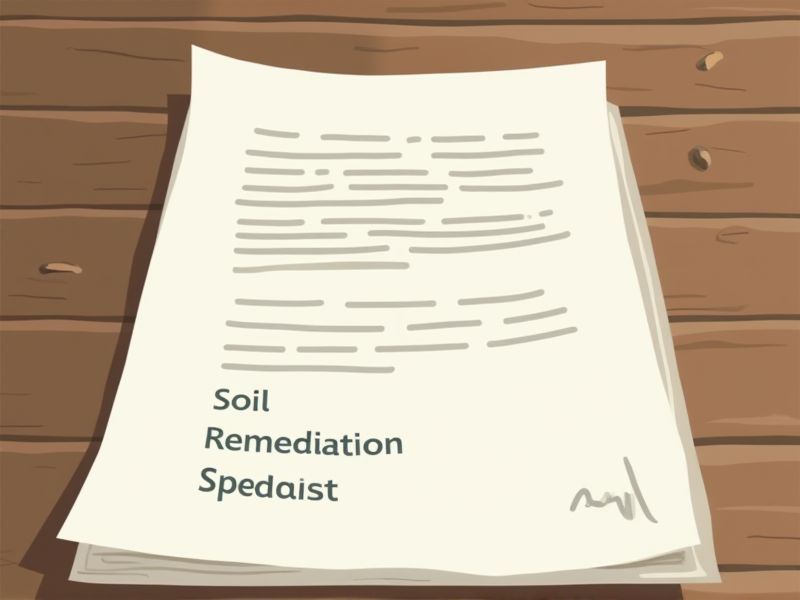
Soil remediation specialists play a critical role in restoring health to contaminated environments, directly impacting ecosystem balance and human safety. Given the technical nature of the job, specific certifications ensure they possess the necessary expertise in handling hazardous substances and applying effective decontamination techniques. Regulatory compliance and adherence to environmental standards further necessitate these certifications to maintain safe and consistent practices. Key certifications important for soil remediation specialists include those in hazardous waste operations, environmental site assessments, and soil science.
Certified Environmental Professional (CEP)
Soil remediation projects require precise planning and execution to safely remove pollutants, and a Certified Environmental Professional ensures adherence to regulatory standards. The CEP credential demonstrates a specialist's expertise in environmental science and engineering, facilitating effective assessment and cleanup strategy development. Projects benefit from the specialist's knowledge in risk assessment and sustainable practices, reducing the chance of environmental harm. Stakeholders gain confidence in remediation outcomes when a CEP oversees the process, contributing to compliance and project success.
HAZWOPER Certification (40-Hour & Refresher)
Hazardous Waste Operations and Emergency Response (HAZWOPER) certification ensures that soil remediation specialists understand hazards related to handling and managing hazardous substances. It equips specialists with safety protocols necessary for minimizing health risks during soil clean-up operations. This certification also ensures compliance with OSHA regulations, avoiding legal and financial repercussions for employers. Regular refresher courses keep specialists updated on new safety procedures and regulatory changes, promoting ongoing workplace safety.
Certified Hazardous Materials Manager (CHMM)
A Certified Hazardous Materials Manager (CHMM) possesses specialized knowledge essential for assessing risks associated with hazardous substances during soil remediation. This credential ensures they understand regulatory requirements, which reduces the likelihood of legal non-compliance. Expertise in hazardous material management enables effective planning for safe cleanup procedures, protecting both workers and the environment. Hiring a CHMM ultimately enhances the credibility and trustworthiness of remediation projects.
RCRA Training Certification
RCRA Training Certification is essential for Soil Remediation Specialists because it equips them with knowledge about handling and disposing of hazardous waste according to federal regulations. Proper training ensures specialists can identify hazardous substances and apply suitable remediation techniques, reducing environmental and health risks. Compliance with RCRA regulations mitigates potential legal liabilities and penalties associated with improper waste management. The certification enhances a specialist's credibility and job prospects in environmental management sectors.
Certified Environmental Specialist (CES)
The presence of a Certified Environmental Specialist ensures adherence to environmental regulations, which is crucial for effective soil remediation. Expertise in environmental science is employed by the CES to identify contaminants and evaluate hazards impacting soil quality. Regulatory compliance and risk assessments conducted by the specialist guide the development of efficient remediation strategies. Proper certification instills trust and credibility, which are vital for stakeholder cooperation in soil remediation projects.
Certified Environmental Auditor (CEA)
Certified Environmental Auditors (CEAs) are essential for Soil Remediation Specialists as they ensure compliance with environmental regulations during remediation projects. Their expertise helps in identifying and mitigating potential risks and liabilities that could arise from contaminated sites. CEAs play a crucial role in verifying the accuracy and reliability of environmental data collected, which supports informed decision-making for remediation strategies. Their certification provides credibility and assurance to stakeholders that the remediation process adheres to industry standards and legal requirements.
LEED Green Associate
Having a LEED Green Associate credential enhances a Soil Remediation Specialist's understanding of sustainable practices. This knowledge supports the implementation of eco-friendly procedures that reduce environmental contamination. The credential also highlights the specialist's commitment to sustainability, appealing to clients seeking green solutions. It provides a competitive edge in projects requiring adherence to environmental and sustainability standards.
Certified Professional in Erosion and Sediment Control (CPESC)
Soil remediation requires expertise in managing soil erosion and sediment runoff, areas where a Certified Professional in Erosion and Sediment Control (CPESC) has specialized knowledge. CPESCs possess the skills to design and implement effective erosion and sediment control plans, reducing environmental impact during remediation projects. Regulatory compliance often necessitates the involvement of certified professionals, like CPESCs, to ensure proper management practices. Hiring a CPESC can lead to more efficient project completion and cost-effective strategies in soil remediation tasks.
Certified Brownfields Professional (CBP)
Certified Brownfields Professionals (CBP) provide expertise in navigating the complex regulatory frameworks associated with brownfield sites, ensuring projects comply with legal standards. Their certification signals a deep understanding of environmental risks, enabling them to identify contamination sources effectively for soil remediation efforts. Their skills in risk assessment and mitigation strategies enhance project outcomes and safety measures. As CBPs are trained in sustainable practices, they contribute to restoring contaminated lands in an environmentally responsible manner.
Certified Water Quality Professional (CWQP)
A Certified Water Quality Professional (CWQP) possesses expertise in identifying and managing contaminants, which directly informs effective soil remediation strategies. Understanding water quality directly impacts soil health, as contaminants often migrate from water sources to soil, necessitating a skilled professional to address both areas comprehensively. A CWQP can guide the integration of remediation technologies that prevent further leaching of pollutants into groundwater. Regulatory compliance in environmental cleanup often requires knowledge of water standards, making a CWQP crucial for ensuring remediation meets legal and environmental guidelines.
Summary
When you earn certifications as a Soil Remediation Specialist, your professional credibility significantly increases. This credibility helps you secure more job opportunities and projects, as clients prefer qualified experts. Enhanced skills acquired through certification lead to improved project efficiency and success rates. Consequently, your marketability and potential earnings grow as demand for certified specialists rises.
